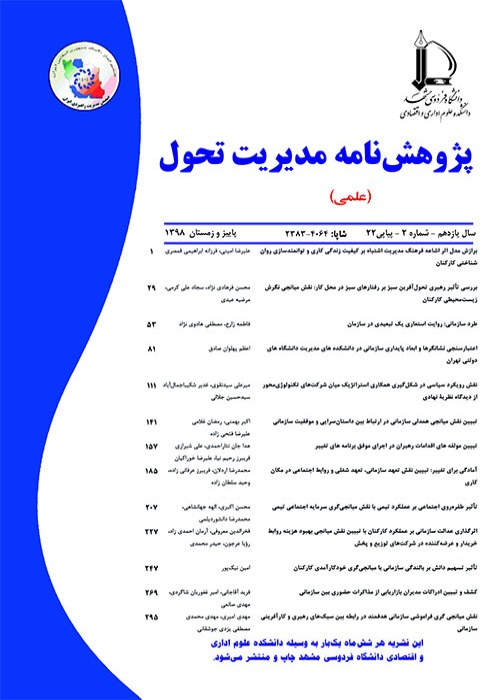Exploring social influence and the effect of professional ethics and political skills on it
Despite decades of insurance industry growth in iran, this industry suffers from a lack of social influence. the per capita cost of insurance in the country is less than $ 100. iran is one of the undeveloped countries in terms of insurance influence (ranked 42nd), because the insurance influence rate in iran is 1.4 percent, while it is 15 percent in developed countries. this study was conducted to examine how the social influence of the insurance industry can be enhanced.
THEORETICAL FRAMEWORK
In the proposed conceptual model, professional ethics and political skills are independent variables and social influence is the dependent variable. in this research, the concept of social influence means the ability to influence or persuade others. in other words, social influence is an intentional collective or individual attempt to change others' beliefs or behavior. in the insurance industry, professional ethics is achieved through following the rules and regulations, justice and fairness, transparency and honesty, keeping human dignity, and respecting social rights. political skill is the manifestation of a person's characteristics and competencies that is able to apply political behaviors. the essence of political skill is the ability to create a shared understanding and includes four dimensions: social astuteness, networking ability, interpersonal influence, and apparent sincerity.
Insurance sellers in north khorasan were considered as the statistical population. out of 1100 people, 276 were selected as the statistical sample after performing a pre-test and placing the standard deviation of responses in cochran's formula. in this research, the data gathering tool was a standard 38-item questionnaire, the validity of which was confirmed by confirmatory factor analysis and its reliability confirmed by cronbach's alpha coefficients. due to the geographical dispersion of the target population, the sample members were selected by cluster sampling. the collected data was analyzed by conducting structural equation modeling in lisrel software.
Based on research findings, increasing the social influence of insurance in iranian society is affected by both political skills and professional ethics. these findings reflect the fact that the promotion of social influence in this industry is strongly influenced by the way actors within the industry act. the results of statistical analysis showed that professional ethics can independently increase the social influence of the insurance industry by up to 60%. research findings also showed that political skills and professional ethics together can anticipate up to 74% of the variance in social influence. political skills have also been shown to play a mediating role between professional ethics and social influence. according to the statistical findings, the professional ethics of the insurance industry is mainly affected by the respect to social rights of customers, and this finding implicitly indicates that the respect for social rights of insurance buyers has a greater and higher role than the respect for human rights. this means that what has the greatest effect on reducing the influence of insurance in society, is related to contract content, bid rates, healthy competition, etc., in which structures (external factors) play a more important role and shape society's perception of insurance.
CONCLUSIONS & SUGGESTIONS
This research indicated that the insurance industry needs social influence to grow. due to the positive consequences for the industry, social influence can correct negative perceptions of the concept of insurance and the insurance industry in public opinion. this industry will be in a good position and will be in its rightful place if the managers of the insurance industry provide the necessary conditions both for the emergence and rise of professional ethics in the context of contracts and service pricing, and the sellers also have the political skills to create a shared understanding with customers. a review of unethical behaviors shows that these behaviors in the insurance industry are because of the importance of economic outcomes. according to these results, it is suggested that those in charge of the insurance industry take a philosophy other than consequentialism to govern their professional ethics. also, since insurance sellers should have an ethical mindset for selling insurance, it was suggested that people without skills and knowledge should not enter these jobs because the subject of selling insurance has many behavioral, psychological, and social complexities. finally, because a large part of the lack of social influence is due to the perceptual resistance to the purchase of insurance, change in contracts, transparency, advertising, and attracting government support to develop social influence is the last suggestion of this study.
- حق عضویت دریافتی صرف حمایت از نشریات عضو و نگهداری، تکمیل و توسعه مگیران میشود.
- پرداخت حق اشتراک و دانلود مقالات اجازه بازنشر آن در سایر رسانههای چاپی و دیجیتال را به کاربر نمیدهد.


